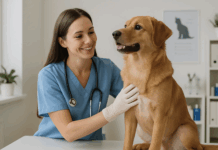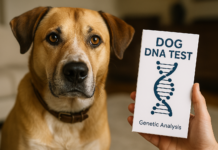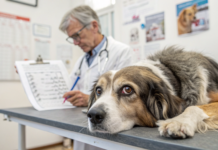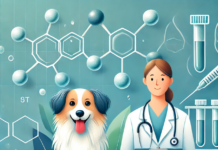Last Updated on September 27, 2023 by Dogs Vets
Common Health Issues in Senior Dogs
As our furry companions age, they bring us immeasurable joy, loyalty, and love. However, just like humans, senior dogs can face a range of health challenges that require our attention and care.
In this comprehensive guide, we’ll delve into the common health issues that affect senior dogs, offering insights, advice, and tips to ensure your loyal companion enjoys a happy and healthy twilight years.
Understanding the Aging Process
Senior dogs age at a faster rate than humans, which means they enter their golden years sooner. This natural process brings about physical and behavioral changes. It’s essential to understand these changes to provide the best care for your furry friend.
Arthritis and Joint Pain
One of the most common health issues in senior dogs is arthritis. This painful condition affects their joints and can lead to reduced mobility. Learn how to recognize the signs and explore treatment options to keep your dog comfortable.
Dental Problems
Dental issues often plague senior dogs. Neglecting oral health can lead to serious complications. Discover how to maintain your dog’s dental hygiene and prevent problems like gum disease and tooth decay.
Vision and Hearing Impairment
As dogs age, their senses can deteriorate. Vision and hearing problems can impact their quality of life. We’ll discuss how to adapt your home and daily routine to accommodate these changes.
Heart Disease
Heart disease can strike senior dogs, affecting their overall well-being. We’ll delve into the common types of heart issues, their symptoms, and treatment options.
Cognitive Dysfunction
Just like humans, senior dogs can experience cognitive decline. Recognize the signs of cognitive dysfunction and learn how to support your furry friend’s mental health.
Cancer
Cancer is a fear that all dog owners share. We’ll explore the common types of cancer in senior dogs, early detection methods, and treatment options.
Incontinence
Incontinence can be an embarrassing issue for both dogs and their owners. Discover the causes and management strategies for this common problem.
Obesity
Senior dogs are prone to obesity, which exacerbates various health issues. Learn about the importance of maintaining a healthy weight and how to achieve it.
Diet and Nutrition
The right diet is crucial for senior dogs’ health. We’ll provide dietary recommendations, including supplements, to support their changing nutritional needs.
Conclusion
In conclusion, senior dogs bring us immeasurable joy, and it’s our responsibility to ensure they enjoy their later years to the fullest.
By understanding and addressing common health issues, you can provide your loyal companion with a comfortable and happy retirement.
Frequently Asked Questions (FAQs)
How can I tell if my dog is experiencing joint pain?
A1: Look for signs like limping, stiffness, or reluctance to move. Consult your vet for a proper diagnosis.
Can I brush my dog’s teeth at home?
A2: Yes, you can, but it’s essential to use dog-specific toothpaste and a suitable brush.
What’s the best way to help my dog with cognitive dysfunction?
Stimulate their mind with interactive toys and puzzles. Consult your vet for medication options if necessary.
Are there any cancer prevention measures for senior dogs?
Regular vet check-ups and early detection are essential. Maintain a healthy lifestyle to reduce cancer risks.
Should I change my dog’s diet as they age?
Yes, senior dogs often require a diet tailored to their specific needs. Consult your vet for dietary recommendations.
How can I help my senior dog lose weight?
Consult your vet for a weight management plan, which may include dietary changes and increased exercise.
Can incontinence in senior dogs be treated?
Yes, in many cases, medication and lifestyle adjustments can help manage incontinence. Consult your vet for guidance.
Remember to consult your veterinarian for personalized advice and treatment plans for your senior dog’s health issues.
Verified Sources:
By addressing these common health issues and providing your senior dog with the care they deserve, you can ensure they enjoy their golden years to the fullest.
Remember that a happy, healthy dog is a lifelong companion that brings joy and comfort to your life.























